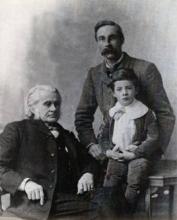The idea that bipolar disorder somehow links with creativity, intelligence, and even genius has an inescapable appeal and is a concept that has kicked around for at least a few decades. It seems somehow heartening to think that at least one psychiatric illness could have a bright side, that some people could productively harness a touch of mania to create notable works of art or literature. Psychologist and bipolar-disorder patient Kay Redfield Jamison published Touched With Fire in 1989, a book-length exploration of “manic depressive illness and the artistic temperament.”
The problem with looking anecdotally at the past lives of famous creators is that retrospective assessment of psychopathology introduces selection bias and lacks reliability. To get a better handle on the academic background of people who develop bipolar disorder, British psychiatrist Robin M. Murray and his associates ran a study, published last year, that reviewed Swedish national school records during 1988-1997 that included academic-performance assessments for more than 700,000 students at age 16 years. The researchers also examined Swedish hospital-discharge records for psychiatric hospitalizations through the end of 2003, which meant that each of the school kids had an average follow-up of more than 9 years for possible psychiatric hospitalization. During follow-up, 280 of the students had an initial hospitalization for bipolar disorder, and 483 had an initial hospitalization for schizophrenia.
As 16-year-old students, those with an academic assessment that exceeded average by more than two standard deviations had a statistically significant, threefold increased risk for later being diagnosed with bipolar disorder in an adjusted analysis that compared them with all the other students. Students on the low end academically, whose assessment at age 16 years put them more than two standard deviations below average, also had a significantly increased, twofold risk for later being diagnosed with bipolar disorder. In contrast, the risk for a later diagnosis of schizophrenia only increased among students at the low end academically. High academic performance at age 16 linked with protection against later developing schizophrenia.
An intriguing finding, but what does it mean? “Are bipolar genes associated with higher IQ or creativity?” Professor Murray asked after he reviewed this research in a talk earlier this month at the annual congress of the European College of Neuropsychopharmacology. He later told me his skepticism about the bipolar and creativity link, a skepticism that he believes other psychiatrists share. “I don’t think it’s accepted [among most psychiatrists], and I don’t think I accepted it,” he told me in an interview. “You do come across these families [where genius and psychiatric disease coexist]. It hasn’t been accepted, but it’s been there. What is more accepted is that patients with bipolar disorder tend to more often come from middle- and upper-class families than do patients with schizophrenia. You have to take it into account [when you speak with patients with bipolar disorder] that you’re talking with people who are smart, and it may help explain why the genes [predisposing people to develop bipolar disorder] have remained in the population,” Professor Murray ultimately characterized the notion of a creativity and bipolar link as “folklore.”
Whether true or not, the problem with viewing bipolar disorder as possibly having the positive side of conferring on at least some patients a “creative,” muse-like impulse is that I believe it diminishes the real risks that bipolar disorder poses to affected patients and to their friends and family. I spoke recently to a person who had been married to a bipolar patient and heard about the scary, horrific episodes of destructive and self-destructive behavior the illness triggered. The debilitating reality of uncontrolled bipolar disorder makes the hypothesis of a link between bipolar and creativity seem inconsequential.
---Mitchel Zoler (on Twitter @mitchelzoler)


